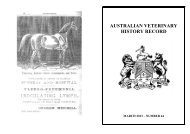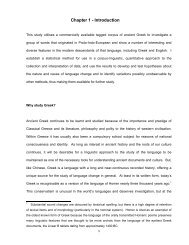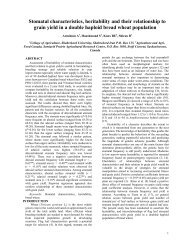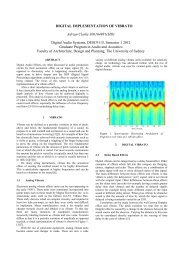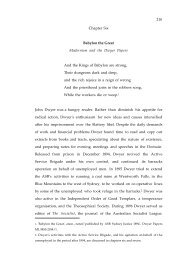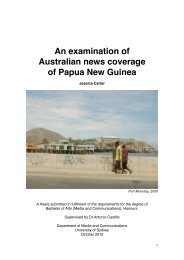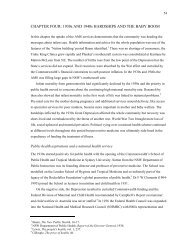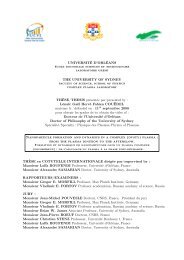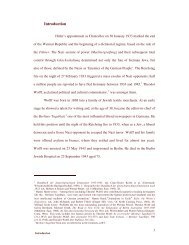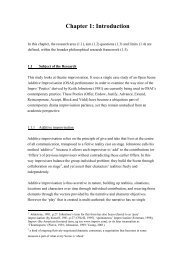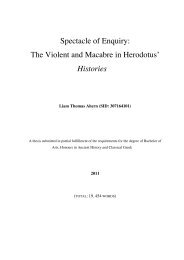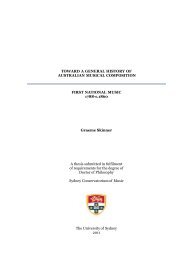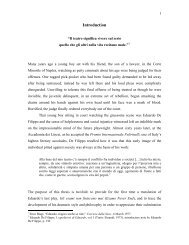journal of digital research & publishing - The Sydney eScholarship ...
journal of digital research & publishing - The Sydney eScholarship ...
journal of digital research & publishing - The Sydney eScholarship ...
You also want an ePaper? Increase the reach of your titles
YUMPU automatically turns print PDFs into web optimized ePapers that Google loves.
1 P M J O U R N A L O F D I G I T A L R ESEARCH & P UBLISHING<br />
greater access to information from the searches made by users. Google is now more than<br />
a content search and provider, Google actively makes new content available through the<br />
digitisation <strong>of</strong> other forms, particularly books.<br />
Is Text Choice Censorship? Libraries and the State<br />
As Google works to compile its library <strong>of</strong> Alexandria, a complete collection <strong>of</strong> all books ever,<br />
we must wonder, by whose standards are books being judged? Traditionally public libraries<br />
choose books based on local standards, interests and by making judgment as to what is<br />
appropriate for their audiences, one might not, for instance, put A Clockwork Orange in<br />
a primary school, or Spot the Dog in a law library. Should we be concerned about the<br />
potential for censorship? <strong>The</strong> American Library Association, quoted in Wired points out<br />
that ‘Although public libraries have <strong>of</strong>ten contended with demands to eliminate or restrict<br />
355%**& 67& *'%5$45& )77H*S& 3"9& 57##%56$7"& 03"3,%0%"6& 8%5$*$7"& )9& 3& '3>6$5(#3>& #$)>3>$3"&<br />
affected only that community. Here, by contrast, if Google bends to political pressure to<br />
remove a book, it will suppress access to the book throughout the entire country’ (Singel<br />
2009, p. 2). Google has responded to concerns about its censorship practices, though<br />
not directly related to potential book censorship, with the release <strong>of</strong> the ‘Government<br />
Requests’ page on its website, asserting that ‘we believe that greater transparency will<br />
lead to less censorship’ (Google 2010 in Forbes, p. 1). <strong>The</strong> page lists the amount <strong>of</strong> requests<br />
made by governments for information about users or the removal <strong>of</strong> information, though<br />
it does not list any results for China.<br />
Concerns regarding censorship have <strong>of</strong>ten been a problem for Google, the company<br />
has a history <strong>of</strong> submitting to state censorship. <strong>The</strong> Google China website, launched in<br />
2006 was created because ‘while removing search results is inconsistent with Google’s<br />
mission, providing no information ... is more inconsistent with our mission’ (Google.<br />
cn 2006, p. 1), Google.cn argued that its compliance with Chinas censorship laws is in<br />
keeping with its practice in Germany and France, where displaying Holocaust denials<br />
or hate speech is illegal, however it could be argued that these topics deny key events in<br />
the history <strong>of</strong> the two countries, while Google.cn alters searches for ‘the banned spiritual<br />
sect “Falungong”, “Taiwan independence” and “human rights”, show[ing] scores <strong>of</strong><br />
links to sites that support the Chinese government position’ (News Limited 2006, p. 1).<br />
Google is also known to moderate the content on YouTube and provides optional family<br />
#),1%,1!0-1%+.!C)+!'1.!.%"+#4%.7!G,!;



